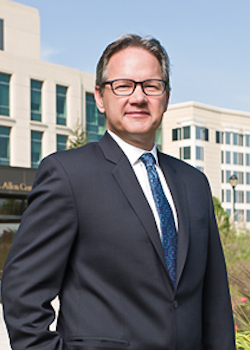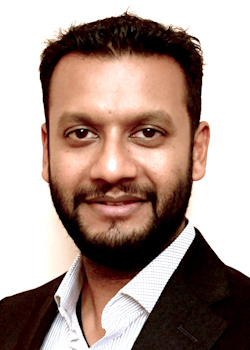In the Wharton program, Dayal focused heavily on innovation offerings: a foundational entrepreneurship class with professor Ethan Mollick; product design with Karl Ulrich; finance- and management-oriented classes on venture capital with Rebecca Zarutskie and Doug Collum.
WHARTON EMBAS DELUGED WITH EDUCATION
Dayal describes the Wharton EMBA as “pretty rigorous,” with the entire course load completed in two years of weekends. The challenging nature of the curriculum is magnified by the breadth and volume of information students receive, Dayal says. “They really go for exhaustion, they throw more material at you than you can absorb,” he says. “That’s kind of the EMBA approach that they take. You don’t necessarily need to understand everything in half these classes to do relatively well in them. But they really strive to give you the absurd amount of stuff if you want it. It’s kind of all there.”
In his classes with Mollick and Ulrich, students had to start fake or real companies and develop hypothetical commercial products – one classmate worked on “selfie stick prototypes” for two months. “He actually developed a 3D-printed version of a selfie stick,” says Dayal, 33.
Probably even more valuable than the classes were extracurriculars, he says. The Wharton Venture Initiation Program, an in-house incubator, provided mentorship, and opportunities to connect with venture capitalists. On “Spring Startup Pitch” day, Dayal pitched Bloom2Bloom, the flower-sales venture he co-founded while in the EMBA program, and made it as far as the finals. Of particular value from the event was advice from Zynga co-founder and Wharton alum Andrew Trader, Dayal says. Program treks to Silicon Valley included time with prominent VCs and Wharton alumni. “You can really take advantage of that and get candid advice from people that otherwise you wouldn’t have access to,” he says.
NEXT STOP FOR EMBA’S ONLINE COMPANY: RETAIL
Dayal had cofounded Bloom2Bloom with the startup’s originator Laurenne Resnik after providing her with legal services, and it is now a going, though relatively modest, concern that takes up an “embarrassing” amount of Dayal’s time. “We’re on track to a half million in revenue this year,” says Dayal, who relies on his work with the legal firm for a primary income. “It’s not a gigantic business but it’s bigger than I thought it would be.” The online company’s next step is into retail shops, he says.
•••
In the Northwestern University Kellogg School of Management EMBA program, about a fifth of each incoming cohort express a desire to do a startup or expand a current business through innovation, says Greg Hanifee, associate dean of EMBA programs at Kellogg. But as the program progresses and students develop confidence and connections, interest rises, according to the school’s pre- and post-program surveys. “What we see is that number goes up between 10 and 15 per cent,” Hanifee says.
Hanifee sees relatively sluggish corporate growth, particularly in some areas of the U.S., as an impetus behind heightened interest in entrepreneurship among EMBAs. “Without that corporate growth that’s happening at a high pace, people do start to think about what are the alternatives for them,” Hanifee says.
Kellogg has added its dedicated EMBA entrepreneurship programming to its extracurriculars, rather than creating new classes, Hanifee says. “We’ve taken the tack of not forcing it into a specific class,” he says, noting that elective classes in technology transfer, private equity, and venture capital emphasize growth through innovation.
BOOT CAMP WITH SPEED MENTORING
In July 2014, Kellogg professor David Schonthal led creation of a new Venture Design Boot Camp for EMBAs. “It’s essentially, if you can imagine, a 36-hour immersion in entrepreneurship, focused on ideation and how to take ideas from zero to a business plan,” Hanifee says. The two-day workshops are topped off with speed mentoring from investors and entrepreneur alumni. One student, who worked for a major department store, used the boot camp to improve his work on customer satisfaction around service-call repairs, “to think more like an entrepreneur in an obviously well-established organization,” Hanifee says. Another student has built a growing enterprise out of his boot camp project on concrete home furnishings.
The added emphasis on entrepreneurship in the Kellogg EMBA program also takes the form of the speakers’ lineup. “We’ve always had . . . speakers come in and talk about how they got to where they are,” Hanifee says. “We’ve integrated over the last few years a lot more talks from entrepreneurs.” The speakers address the pros and cons of the entrepreneurial life, to “paint the real picture of what it’s like, not to dampen enthusiasm,” Hanifee says. “They have real stories to tell.”
Kellogg EMBA student Nishad Parmar, about to graduate in June, took three of Kellogg’s “global electives” – two weeks at the Illinois campus and a week in another location – in Germany, India, and Tel Aviv. The two courses from a week in Tel Aviv, on venture capital and product management, provided crucial knowledge he had lacked, coming from an engineering background, he says.
Attending lean startup sessions taught by Schonthal, and the Venture Boot Camp, familiarized Parmar with the lean methodology he’s been applying to a startup. “I learned about the business canvas model and creative ways to prototype ideas/concepts without large investments,” Parmar says.
Now, with 10 other EMBA candidates from his cohort, he is about to launch “Kellogg Angels,” an angel investment group focused on providing mentorship to new entrepreneurs along with financing.
EMBAS CREATING NEW MODEL FOR ANGEL FINANCING
The group are applying lean startup methods to the venture, to “create an investor group that is lean and is agile,” says Parmar, 35. They’re creating a new model for an angel investor group that they hope will cut to a month from three months the process of screening applicants, receiving pitches, and making funding decisions.







Questions about this article? Email us or leave a comment below.